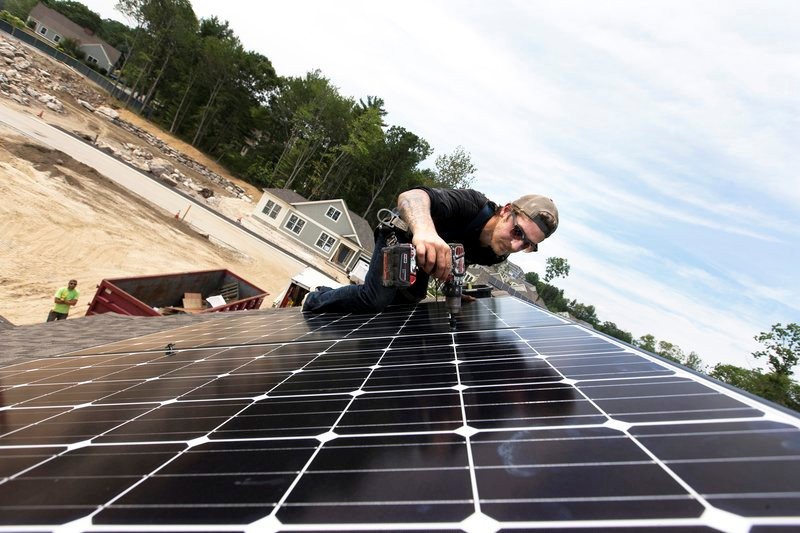特朗普提高中国光伏产品进口关税

|
日前,美国总统特朗普正式批准对进口太阳能电池和光伏面板征收30%的关税,受影响的光伏产品大多数进口自中国。部分美国光伏行业人士称,此举将限制平价光伏产品进入美国,并将导致许多人因此失业。 美国此次对光伏产品加增的税额将在四年内逐年递减。不过美国今年首批进口的2.5千兆瓦的太阳能电池将不会受此次增税影响。 据称,美国贸易代表署是在与美国贸易政策委员会、美国国际贸易委员会等机构进行跨部门会商后,向特朗普做出了对进口光伏产品加征关税的建议的。美国贸易代表署去年九月就曾指出,低价光伏面板的进口已经伤害了美国制造企业的利益。 美国贸易代表署的罗伯特·莱特希泽在一份声明中称:“在几个月的时间里,有一些美国企业已经国际贸易委员会提起了贸易诉讼。总统的决定再次表明,特朗普政府将始终保护美国工人、农民、牧民和企业的利益。” 虽然此次加征关税针对的是所有外国企业,但美国贸易代表署首当其冲的目标仍是中国。据该机构提供的数据称,由于中国对光伏产业的政策支持和巨额补贴,中国在全球光伏市场上的占有率已经从2005年的7%猛增至2012年的61%。现在全球60%的太阳能电池和71%的光伏组件都是中国生产的。 中国在光伏产业上的崛起也造成了美国光伏产业的分裂。一方面,像Suniva和SolarWorld等本土光伏企业纷纷表示,面对低价进口光伏产品的冲击,他们已经没有任何盈利空间。另一方面,随着光伏产品的价格下降,美国有许多住宅、商用建筑和太阳能发电厂都用上了太阳能,从而也令美国的太阳能安装行业受益不少。 美国太阳能产业协会表示,美国此次加征进口光伏关税的决定将导致约23000人今年因此失业,其中也包括很多制造业岗位。并将导致数十亿美元的投资因此被推迟乃至取消。 “靠加征关税,美国造不出能满足国内需求的电池或面板,加征关税也救不了外资控股的Suniva和SolarWorld等公司,但它会在一个已经繁荣发展的行业造成一种危机,最终导致数万名努力工作的美国蓝领工人失业。”美国太阳能产业协会主席兼CEO阿尔盖比·罗斯·霍珀表示。 据美国太阳能产业协会称,截止到2016年底,美国光伏制造业约有38000名工人,但其中直接生产太阳能电池和面板的只有2000人。因此直接受到低价进口光伏产品冲击的产业工人其实只有这么多。 特斯拉本身也是光伏产品的使用大户,该公司对《财富》表示,该公司继续与松下公司合作扩大纽约布法罗工厂的产能,此次对进口产品加征关税不会对其造成影响。特斯拉既使用进口电池,也与松下合作生产电池,并可使用传统太阳能面板和该公司最新的光伏面板发电。 美国太阳能产业协会还指出,此次加征的关税虽然幅度甚高,但还远没有达到Suniva和SolarWorld等美国本土公司的要求。 比如2017年4月,美国光伏制造企业Suniva在申请破产保护后的第九天便向美国国际贸易委员会请愿,称面对廉价进口光伏面板的大量涌入,该公司已根本无法与之竞争。SolarWorld公司也支持了Suniva的请愿。有意思的是,Suniva其实是一家主要由中资控股的公司,背后的大股东是中国太阳能面板制造商顺风国际清洁能源有限公司,该公司主要在乔治亚州和密歇根州生产光伏产品。SolarWorld则是一家德国公司,在俄勒冈州设有一家子公司。 两家公司都表示,向进口光伏产品加征关税,将有利于在美国国内创制造业就业岗位。 不过也有20多家美国国内的太阳能安装设备制造商于去年8月集体致信美国国际贸易委员会,称Suniva公司要求的提高关税一旦获准,将导致美国的太阳能面板价格上升一倍以上,这将严重影响太阳能发电的成本竞争力,美国太阳能发电的高增长率或将迅速反转。 本月月初,美国太阳能产业协会的零珀致信特朗普,要求后者不要对进口光伏提高关税。 零珀在这封1月17日寄出的信中表示:“讽刺的是,我们最想增长的就业岗位,也就是美国制造业的就业岗位,恰恰受到的影响最大,因为太阳能发电项目的数量必将大幅缩减。这不是危言耸听,而是即将发生的事实。另外美国国内还有不少企业专门做光伏产品的配套设备,如钢制或铝合金支架、逆变器、探测设备等。如果因为加征关税而提高了光伏产品的价格,则这些下游产品的需求也将受到影响,并导致很多制造业工人失业。”(财富中文网) 译者:朴成奎 |
President Donald Trump imposed a 30% tariff on imported solar cells and panels—most of which are Chinese made—in a move that some in the industry argue will cut the flow of cheap panels to installers in the U.S. and lead to job losses. The tariffs will decline over a four-year period. The first 2.5 gigawatts of imported solar cells are excluded from the additional tariff. The U.S. Trade Representative made the recommendations to Trump after consulting with the interagency Trade Policy Committee and following findings by the U.S. International Trade Commission, which ruled in September that imports of low-cost solar panels have hurt U.S. manufacturers. “These cases were filed by American businesses and thoroughly litigated at the International Trade Commission over a period of several months,” U.S. Trade Representative Robert Lighthizer said in a statement. “The President’s action makes clear again that the Trump Administration will always defend American workers, farmers, ranchers, and businesses in this regard.” Although the tariffs are meant to apply to any foreign company, the USTR focuses on China. As a result of the country’s policies and subsidies, China’s share of global solar cell production has exploded from 7% in 2005 to 61% in 2012, according to the USTR fact sheet. China produces 60% of the world’s solar cells and 71 percent of solar modules. The issue has split the solar industry. On one side are a few solar manufacturers like Suniva and SolarWorld that say low-cost imports have made it impossible to be profitable. On the other side is the U.S. solar installation industry, which has benefited from low-cost panels that have led to explosive growth in rooftop systems on homes and commercial buildings as well as massive solar farms. The Solar Energy Industries Association, a trade organization formed to represent all aspects of the U.S. solar industry, says the decision will cause the loss of roughly 23,000 American jobs this year, including many in manufacturing. SEIA says the decision will result in the delay or cancellation of billions of dollars in solar investments. “While tariffs in this case will not create adequate cell or module manufacturing to meet U.S. demand, or keep foreign-owned Suniva and SolarWorld afloat, they will create a crisis in a part of our economy that has been thriving, which will ultimately cost tens of thousands of hard-working, blue-collar Americans their jobs,” said SEIA President and CEO Abigail Ross Hopper. There were 38,000 workers in solar manufacturing in the U.S. at the end of 2016, according to SEIA, adding that all but 2,000 made something other than cells and panels, the subject of the trade case. Tesla, which is a solar installer and a domestic manufacturer, told Fortune that the decision has not impacted its commitment to expanding manufacturing, including at its 1.2 million-square-foot factory in Buffalo, NY that is operated in a partnership with Panasonic. Tesla uses imported cells and produces its own cells with Panasonic, which are used in traditional solar panels and its new solar tiles product. SEIA noted that the tariffs were nowhere near as steep as what Suniva and SolarWorld requested. Manufacturer Suniva petitioned the ITC in April 2017, nine days after the company sought Chapter 11 bankruptcy protection, arguing that an influx of cheap panels made it impossible for it to compete. SolarWorld supported its petition. Suniva, majority owned by Chinese solar panel maker Shunfeng International Clean Energy, made panels in Georgia and Michigan. SolarWorld is a German manufacturer that has a subsidiary based in Oregon. Both companies have argued that tariffs would help create manufacturing jobs in the U.S. More than two dozen domestic solar mounting equipment manufacturers and their domestic suppliers told the ITC, in a letter sent in August, that the tariffs requested by Suniva would more than double the price of solar panels in the U.S. and undercut the cost-competitiveness of solar and reversing its high growth trajectory. SEIA’s Hopper sent a letter to Trump earlier this month urging the president not to impose new tariffs. “Ironically, the very jobs we all want to grow, American manufacturing jobs, will retract as the number of projects are scaled back significantly,” Hopper wrote in the letter sent on Jan. 17. ” This is not hype; this is what will happen. American companies manufacture, among other things, steel and aluminum racking systems, inverters and tracking devices. Raising solar prices, as these tariffs would do, would reduce demand for those downstream products and kill manufacturing jobs.” |













